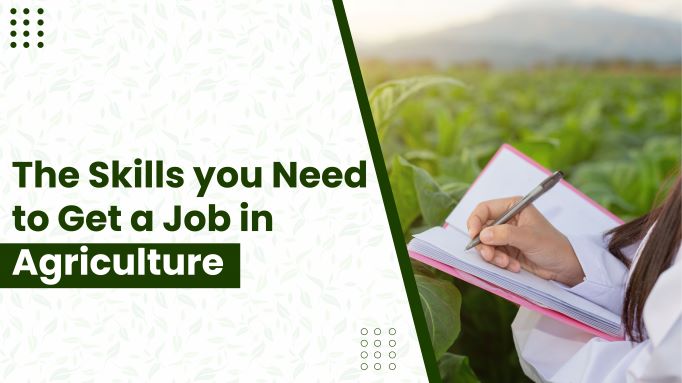The Skills you Need to Get a Job in Agriculture

Agriculture is an often ignored field when it comes to dreaming of future careers in our country. With more and more people moving out of rural areas into the hustle and bustle of metropolitan India to look for jobs, it is no surprise that the agricultural sector is ignored. This is a sad reality for a country whose majority of the workforce (42%) is involved in agriculture and contributes to around 20% of the country’s GDP (Gross Domestic Product).
However, agriculture can be a highly lucrative industry with the bleed-in of technological advancements that have been slowly happening in the country over the last few decades. There is an evident shortage of skilled labor in this sector which can be easily filled if you have the proper education and skillset. This blog discusses just that – how to prepare yourself to get a job in the agriculture industry.
Table of Contents
- Getting Started in the Field of Agriculture
- Diploma Programs
- Bachelor of Science in Agriculture
- Master of Science in Agriculture
- Major Skills you required to get a job in the Agriculture Sector
- Communication and Interpersonal Skills
- Technical Knowledge
- Versatility and Adaptability
- Organization and Time Management
- FAQs
Table of Contents
Getting Started in the Field of Agriculture
Before we get started on the skills you need to get a job in the agriculture field, let us discover how to be eligible for jobs in that sector first. To get started on your journey to have a successful career in this sector, you need to have a degree in agriculture first. There are various types of agricultural programs that you can choose from, which we will discuss in detail.
Diploma Programs
Diploma programs in agriculture deal with modern equipment and techniques used in farming, livestock farming, agricultural theory, and lots more. The best diploma in agriculture college, MGU, offers practical experience in crop farming and animal husbandry in its diploma program so that students can build successful careers in production, post-harvest, advising, retail, processing, and many more sectors.
Eligibility: 50% in 10th Board. 5% relaxation for reserved categories as per state government norms.
Duration: 2 Years
Mode: Yearly
Bachelor of Science in Agriculture
Bachelor of Science in Agriculture is an undergraduate course that can be pursued after the 12th or a diploma course. The course curriculum is designed with agricultural concepts, techniques, and methods along with in-field experience to foster interest in students in MGU, the best BSc Agriculture college in Bhopal.
Eligibility: 10+2 with minimum 50% marks, along with Physics, Chemistry, and Mathematics/Biology/Agriculture subject combination. Students can opt for lateral entry if they have completed a Diploma in Agriculture.
Duration: 4 Years
Mode: Semester
Master of Science in Agriculture
A Master of Science in Agriculture is a postgraduate degree that students can pursue after completing an undergraduate degree in any relevant field. This course inculcates advanced agricultural knowledge in students along with cross-disciplinary subjects such as horticulture, apiculture, etc. The course module for this program in MGU, the best MSc Agriculture college in MP involves progressive practical training in farming with agricultural experts.
Eligibility: 50% in BSc Agriculture/Horticulture/equivalent
Duration: 2 Years
Mode: Semester
Major Skills you required to get a job in the Agriculture Sector
Communication and Interpersonal Skills
Now that we have had a look at the educational qualifications, let us look at the other skills you will need to get a job in the agricultural sector. The most important skill you need to master in any industry is the ability to communicate and interact effectively with other people. Most jobs in the agriculture sector require solid communication, whether it be in supply-chain management or even just as a seller negotiating the price of produce.
Being able to build relationships, business or otherwise, negotiate and interact with all the people involved in various chains of a farming setup – from government regulatory bodies to clients and suppliers is really important to have a good career in the agricultural sector.
Technical Knowledge
If you have a degree from MGU, the best agriculture college in Bhopal, we might not need to tell you how important it is to have sound knowledge of technology in the field of agriculture these days. Most of the processes involved in farming like irrigation, pesticides, cultivation, harvest, storage, and transport can benefit a lot from technological advances that have been made.
A large amount of data can also be generated on a daily basis from what usually goes on on a farm. This data, when analyzed and interpreted properly can be a gold mine for understanding trends and utilizing them to streamline processes further or make better yields.
Technology can also benefit farmers who have to deal with extreme weather conditions. Internet of Things (IoT) applications in farming – from livestock monitoring, smart greenhouses, drones, farm management systems, and crop management systems – all of which are covered at MGU, the best university in MP, can change the way farmers deal with stuff and make their lives much easier.
Versatility and Adaptability
Versatility is one of the most important skills that you will need to work a job in the agriculture sector. Whatever you study in any agriculture college in MP, nothing will prepare you for the ever-changing conditions in a field. To adapt to that, you will need to learn to problem-solve on your feet – interpreting what you see from analyzing a situation to applying your knowledge to fix the problems that will arise from time to time.
The agricultural industry is in a state of constant flux, from changing consumer demands, legislations, and weather, you need to be prepared to adjust to them always and without fail, preferably as soon as possible.
Organization and Time Management
Agriculture is a highly complex industry, with different parts of it related but completely interdependent from each other. Organization and time-management skills are invaluable in this sector as everything, from harvesting, feeding livestock, seeding, planting, etc, is very dependent on the correct timing. Managing so many aspects that go on in a farming setup, from simple jobs such as ensuring things are picked up at the right time, to harder ones such as meeting regulatory requirements, can be overwhelming without good organizational skills.
Mansarovar Global University offers all three types of agricultural programs – diploma, BSc, and MSc in agriculture that is in line with the best agricultural programs in the world. The mix of classroom teaching and on-field experience that you will gather in any of these programs is ideal to get you a job in the agriculture industry, making MGU the premier university in Bhopal for all your educational needs in agriculture.
FAQs
- Is a BSc in Agriculture degree expensive?
No. BSc in Agriculture degrees range between 2-3 lakhs in most colleges. Considering that completing one can get you a job with a 1.5-2 LPA salary easily, it is a good investment for your career.
- What is a lateral entry in BSc Agriculture?
If you have completed a diploma in agriculture already, certain agriculture colleges like MGU offer you a place in their BSc Agriculture programs where you can directly enter the 2nd or 3rd year. This is called lateral entry.
- Do I have to sit in any kind of entrance exam for admission to an agricultural course?
No. While certain colleges do take admissions on the basis of entrance examinations like MHT CET, KCET, AP EAMCET, and others, most of the agricultural colleges take direct admission on the basis of marks secured in your 10+2.
- Will I learn how to operate agricultural drones in an agricultural course?
Yes. There is no reason not to learn that. MGU offers on-field experience with deep learning about agricultural technology in its theory classes so that you can stay in touch with the latest and greatest technologies in agriculture for your future career.
- Is an MSc in Agriculture necessary after completing a BSc?
No. However, an MSc in agriculture will allow you to specialize in one subject, opening you to more and higher paying opportunities than just a BSc degree.










